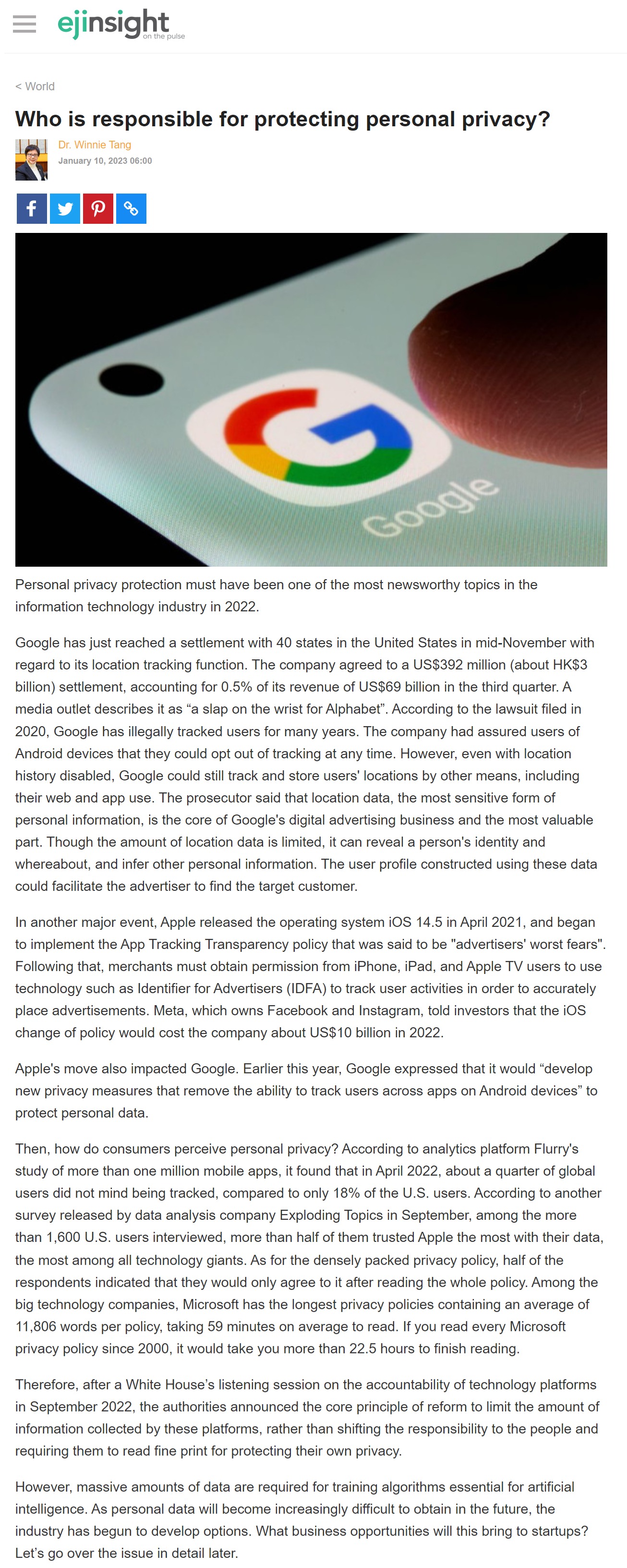網上版請按此

Who is responsible for protecting personal privacy?
Personal privacy protection must have been one of the most newsworthy topics in the information technology industry in 2022.
Google has just reached a settlement with 40 states in the United States in mid-November with regard to its location tracking function. The company agreed to a US$392 million (about HK$3 billion) settlement, accounting for 0.5% of its revenue of US$69 billion in the third quarter. A media outlet describes it as "a slap on the wrist for Alphabet". According to the lawsuit filed in 2020, Google has illegally tracked users for many years. The company had assured users of Android devices that they could opt out of tracking at any time. However, even with location history disabled, Google could still track and store users' locations by other means, including their web and app use. The prosecutor said that location data, the most sensitive form of personal information, is the core of Google's digital advertising business and the most valuable part. Though the amount of location data is limited, it can reveal a person's identity and whereabout, and infer other personal information. The user profile constructed using these data could facilitate the advertiser to find the target customer.
In another major event, Apple released the operating system iOS 14.5 in April 2021, and began to implement the App Tracking Transparency policy that was said to be "advertisers' worst fears". Following that, merchants must obtain permission from iPhone, iPad, and Apple TV users to use technology such as Identifier for Advertisers (IDFA) to track user activities in order to accurately place advertisements. Meta, which owns Facebook and Instagram, told investors that the iOS change of policy would cost the company about US$10 billion in 2022.
Apple's move also impacted Google. Earlier this year, Google expressed that it would "develop new privacy measures that remove the ability to track users across apps on Android devices" to protect personal data.
Then, how do consumers perceive personal privacy? According to analytics platform Flurry's study of more than one million mobile apps, it found that in April 2022, about a quarter of global users did not mind being tracked, compared to only 18% of the U.S. users. According to another survey released by data analysis company Exploding Topics in September, among the more than 1,600 U.S. users interviewed, more than half of them trusted Apple the most with their data, the most among all technology giants. As for the densely packed privacy policy, half of the respondents indicated that they would only agree to it after reading the whole policy. Among the big technology companies, Microsoft has the longest privacy policies containing an average of 11,806 words per policy, taking 59 minutes on average to read. If you read every Microsoft privacy policy since 2000, it would take you more than 22.5 hours to finish reading.
Therefore, after a White House's listening session on the accountability of technology platforms in September 2022, the authorities announced the core principle of reform to limit the amount of information collected by these platforms, rather than shifting the responsibility to the people and requiring them to read fine print for protecting their own privacy.
However, massive amounts of data are required for training algorithms essential for artificial intelligence. As personal data will become increasingly difficult to obtain in the future, the industry has begun to develop options. What business opportunities will this bring to startups? Let's go over the issue in detail later.
Dr. Winnie Tang
Adjunct Professor, Department of Computer Science, Faculty of Engineering; Department of Geography, Faculty of Social Sciences; and Faculty of Architecture, The University of Hong Kong